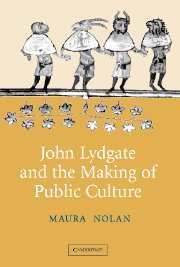Book contents
- Frontmatter
- Contents
- Acknowledgments
- Introduction: the forms of public culture
- 1 Tragic history: Lydgate's Serpent of Division
- 2 Social forms, literary contents: Lydgate's mummings
- 3 Tragedy and comedy: Lydgate's disguisings and public poetry
- 4 Spectacular culture: the Roman triumph
- Bibliography
- Index
- CAMBRIDGE STUDIES IN MEDIEVAL LITERATURE
3 - Tragedy and comedy: Lydgate's disguisings and public poetry
Published online by Cambridge University Press: 22 September 2009
- Frontmatter
- Contents
- Acknowledgments
- Introduction: the forms of public culture
- 1 Tragic history: Lydgate's Serpent of Division
- 2 Social forms, literary contents: Lydgate's mummings
- 3 Tragedy and comedy: Lydgate's disguisings and public poetry
- 4 Spectacular culture: the Roman triumph
- Bibliography
- Index
- CAMBRIDGE STUDIES IN MEDIEVAL LITERATURE
Summary
In 1590 Edward Allde printed Lydgate's Serpent of Division together with Sackville and Norton's Gorboduc as illustrations of the dangers of civil war and strife. For Allde, the link between Lydgate's treatise and the revenge tragedy was one of content rather than form; both texts serve a didactic function by showing readers the terrible consequences of political division:
Three things brought ruine vnto Rome,
that ragnde in Princes to their ouerthrowe:
Auarice, and Pride, with Enuies creull doome,
that wrought their sorrow and their latest woe.
England take heede, such chaunce to thee may come:
Foelix quem faciunt aliena pericula cautum.
But the sympathy between Serpent of Division and Gorboduc is not limited to their topicality. What Allde sensed about Serpent was that its fundamentally tragic structure resonated profoundly with the dramatic genre of tragedy as Sackville and Norton had defined it – and indeed, by identifying the tract as a precursor to Gorboduc, he constructed a literary history of tragedy that inserted the medieval into the humanist narrative of genre formation that moved from classical to Renaissance, Seneca to Hamlet. In this alternate version of literary transmission, tragedy is quintessentially a political form, bound up with the production of sovereignty and the state, with a clearly defined function in relation to authority.
- Type
- Chapter
- Information
- John Lydgate and the Making of Public Culture , pp. 120 - 183Publisher: Cambridge University PressPrint publication year: 2005



